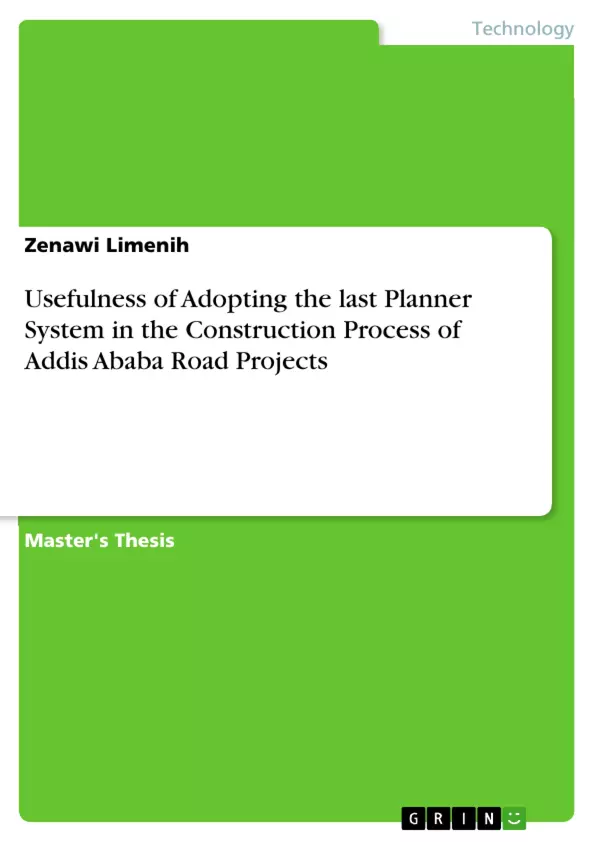Modern construction is characterized by its efficient utilization of construction resources to accomplish numerous construction activities without waste. But, Addis Ababa’s Road construction projects fail to be executed on time, within the allocated budget, and with the desired quality. To solve this problem, a new management concept is introduced, namely lean construction. It is known to increase productivity and minimize waste. To realize this solution, last planner system (LPS) is used; it is one tool of lean construction. It is a person or group of people with the task to control the production unit. The main objective of this study is to assess usefulness of the last planner system implementation to advance the current construction process management in Addis Ababa city road projects. The research was conducted on selected asphalt road construction projects located in Addis Ababa city. To address the problems Questioners, observations, interviews, focus group discussion, and recently published journals were employed as a qualitative and quantitative data collection tools and analyzed using statistical package for the social science version 26 and super decision model version 3.2. The finding shows that; the construction management process adopted in all three sites is more or less similar they use a push planning system and critical path method to determine the duration following the master schedule but have no weekly work plan and lookahead schedule to forecast the coming week's duty. The LPS implementation expected barriers are also ranked from one to five: as Labor-related, internal working environment-related, stakeholders-related, exogenous related, and material related expected barriers respectively. The last planner system has many benefits as agreed by different scholar’s those are time-related, Cost-related, claim-related, and quality-related benefits are the main benefits obtained through the LPS implementation and it is possible to conclude; LPS is useful for the road construction management system. The research is significant in creating awareness & understanding on the adoption of the lean construction tool (LPS) in sustainable construction, to improve knowledge and understanding of the implementation of LPS. Moreover, the LPS implementation conceptual framework was also developed based on the last planner system principles.
Inhaltsverzeichnis (Table of Contents)
- Introduction
- Background of the Study
- Statement of the Problem
- Objectives of the Study
- Research Questions
- Significance of the Study
- Scope of the Study
- Organization of the Study
- Literature Review
- Concept of Lean Construction
- Last Planner System (LPS) Implementation
- Benefits of LPS Implementation
- Challenges of LPS Implementation
- LPS Implementation in Road Construction
- Research Methodology
- Research Design
- Study Area
- Data Collection Methods
- Data Analysis Techniques
- Results and Discussions
- LPS Implementation Status
- LPS Implementation Barriers
- Benefits of LPS Implementation
- Impact of LPS Implementation
- Conclusions and Recommendations
- Conclusions
- Recommendations
Zielsetzung und Themenschwerpunkte (Objectives and Key Themes)
This thesis examines the usefulness of adopting the Last Planner System (LPS) in Addis Ababa road construction projects. The research aims to assess the current construction management process, identify the potential benefits and barriers of implementing LPS, and propose recommendations for its successful adoption. The thesis explores the impact of LPS on various aspects of road construction, including time, cost, quality, and overall project performance.
- Current construction management practices in Addis Ababa road projects
- Potential benefits of adopting the Last Planner System (LPS)
- Barriers to implementing LPS in Addis Ababa road projects
- The impact of LPS on project performance, including time, cost, and quality
- Recommendations for successful implementation of LPS in Addis Ababa road projects
Zusammenfassung der Kapitel (Chapter Summaries)
- Introduction: This chapter provides an overview of the study, including its background, research questions, objectives, and significance. It also introduces the concept of lean construction and its application in road construction projects.
- Literature Review: This chapter explores the existing literature on lean construction, the Last Planner System (LPS), and its implementation in various construction projects. It highlights the benefits and challenges of adopting LPS in road construction projects.
- Research Methodology: This chapter details the research design, study area, data collection methods, and data analysis techniques employed in the study. It describes how the research was conducted to collect relevant data on LPS implementation in Addis Ababa road projects.
- Results and Discussions: This chapter presents the findings of the study, focusing on the current construction management practices, the potential benefits and barriers of implementing LPS, and the impact of LPS on project performance. It analyzes the data collected and discusses the implications of the findings.
Schlüsselwörter (Keywords)
The primary focus of this thesis lies on the application of lean construction principles, particularly the Last Planner System, in the context of road construction projects in Addis Ababa. This study explores the feasibility and effectiveness of LPS in improving project efficiency, reducing waste, and enhancing overall performance. The research aims to provide valuable insights into the current state of construction management in the region and to identify practical solutions for enhancing project outcomes.
- Arbeit zitieren
- Zenawi Limenih (Autor:in), 2022, Usefulness of Adopting the last Planner System in the Construction Process of Addis Ababa Road Projects, München, GRIN Verlag, https://www.grin.com/document/1185066



